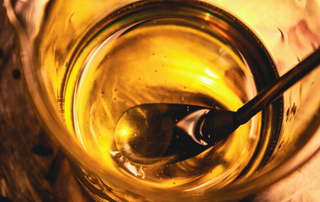Modern routines are incredibly fast-paced, so much so that stress has become a common part of everyday life. While we often hear about how stress can affect the heart, digestion, and even sleep, we rarely consider the impact on scalp health.
Emerging research in psychodermatology and dermatology suggests that stress plays a significant role in scalp health by elevating cortisol levels, disrupting the scalp’s barrier function and triggering inflammatory pathways that worsen skin conditions like dandruff, seborrhoeic dermatitis and psoriasis. In this blog, we’ll take a look at the connection between the mind and skin, and explore how targeted scalp care, like Polytar shampoo, can help restore balance.
The connection between the mind and skin
The skin is the body’s largest organ, and it communicates closely with the brain through a complex network of nerves, hormones and immune responses. This is often referred to as the “brain-skin axis”. When stress levels rise, the brain releases cortisol and other stress hormones, which may disrupt the scalp’s natural balance.
Stress can be a trigger for:
- Increased oil production: Stress can stimulate sebaceous (oil) glands, leading to oily buildup on the scalp.
- Weakened barrier function: High cortisol levels can impair the scalp’s protective barrier, making it more prone to irritation and sensitivity.
-
Inflammatory response: Stress can drive inflammation, which often worsens conditions such as
Many people notice scalp irritation and flare-ups when stress is at a higher or elevated level – for example, during exams, high-pressure projects at work, or emotional upheavals. It’s especially important to give our scalps a little extra care during times like these.
Stress-linked scalp conditions
Here are the scalp conditions that are most likely to flare up during times of stress:
Dandruff and seborrhoeic dermatitis
Dandruff is one of the most common stress-related scalp issues. Stress doesn't directly cause dandruff, but it can weaken the immune system and create a more favourable environment for Malassezia yeast, which contributes to flaking and itching, to grow.
Psoriasis flare-ups
Psoriasis is a chronic autoimmune condition that often worsens during times of stress. Flare-ups on the scalp can cause thick, scaly patches that are uncomfortable and sometimes even painful. Stress management plays a crucial role in reducing the frequency and intensity of these flare-ups.
Hair shedding
Emotional and physical stress can shock hair follicles into the resting phase, leading to increased shedding weeks later. While temporary, this type of hair loss can be distressing and sometimes fuels the cycle of stress even further.
How stress manifests on the scalp
The symptoms of stress-related scalp condition flare-ups can be subtle at first, but they often escalate if left untreated. If you feel more stressed than normal, you may experience:
- Persistent itching
- Redness or tenderness
- Flaky or scaly patches
- Increased hair shedding
Being aware of these signs early can help you take proactive prevention steps, such as adopting stress management techniques and using an appropriate scalp care routine in your day-to-day.
[H2] How scalp care ties into stress management
While stress reduction through meditation, exercise or therapy is essential, topical treatments can provide important relief for scalp symptoms. Choosing the right shampoo is one of the simplest and most effective ways to manage common stress-related scalp flare-ups.
Coal tar shampoo and scalp condition flare-ups.
Coal tar is an ingredient that’s known for its ability to:
- Slow down rapid skin cell turnover, which is especially helpful in psoriasis and dandruff.
- Reduce itching and inflammation.
- Relieve scaling and discomfort.
Polytar Scalp Shampoo contains 4% coal tar solution, which is used to treat scalp conditions such as dandruff, psoriasis, eczema and seborrhoeic dermatitis.
Polytar Scalp Shampoo can help to:
- Soothe irritation: By calming inflammation, Polytar's soothing formula can help reduce itchiness and dryness.
- Control flaking: Polytar slows excessive shedding of skin cells, helping to manage dandruff and psoriasis plaques.
- Restore comfort: Polytar helps maintain a healthier scalp environment – even during stressful times.
As with all medicines, always read the label and leaflet before use and consult with a healthcare professional if the symptoms persist or worsen.
Holistic tips for scalp and stress relief
Combining an effective scalp care product with stress-reducing habits is best for long-term results. Here are some lifestyle-related approaches you can take to help manage your stress levels:
Mindfulness and meditation
Being present within your surroundings and your feelings in the moment helps calm the nervous system and reduce cortisol spikes. Simple therapeutic exercises like yoga or mindful breathing techniques are enough to slow the heart rate and reduce stress. They can also be practised easily at home.
Exercise
Regular movement – such as a simple 30-minute walk a day – helps with circulation, including to the scalp, while reducing tension felt throughout your body. The endorphins released during exercise act as “feel-good” chemicals, which can help reduce feelings of anxiety while creating a sense of calm.
Balanced diet
A balanced diet plays a surprisingly powerful role in managing stress. That’s because the nutrients we consume directly affect our brain chemistry, hormone regulation and overall resilience to stress. In particular, nutrients like omega-3s, zinc and vitamin D support scalp and hair health.
A balanced diet:
- Stabilises blood sugar
- Nourishes the nervous system
- Reduces inflammation
- Improves sleep quality
Opt to include complex carbohydrates, oily fish, nuts, seeds and leafy greens as part of a healthy, balanced diet.
Adequate sleep
Sleep is one of the most underrated factors in stress management and scalp health. While we often focus on shampoos and topical treatments, getting eight hours of good sleep a night aids in cellular repair and reduces inflammatory responses within the body.
When to see a dermatologist
While mild stress-related scalp issues can often be managed at home with topical scalp treatments, persistent or severe symptoms may require professional guidance. Consult a doctor, dermatologist or healthcare provider if you experience:
- Painful or bleeding scalp patches
- Sudden, unexplained, or persistent hair loss
- Little or no improvement after several weeks of treatment
Getting ahead of the problem can prevent complications further down the line and help you get the best treatment plan for your specific scalp concerns.







